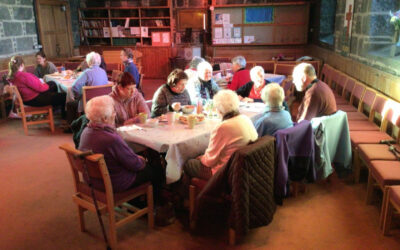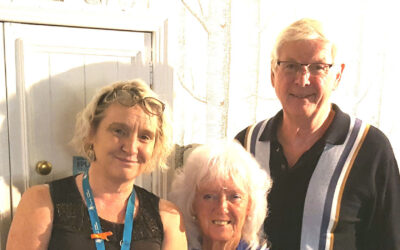Rotary clubs in East Anglia are working on a project encouraging more people to install smoke detectors in their own homes.
The initiative was prompted by Peter Andrews and two colleagues from Stowmarket Gipping Valley Rotary following an appeal made by Suffolk Fire & Rescue Service.
“After training, we started to do safer home visits in Suffolk and soon discovered that smoke alarm availability was becoming limited,” explained Peter.
“So we instigated a meeting with the Prevention Department and were told their budgets were being drastically reduced which would ultimately put lives at risk.
“We saw this as the ideal opportunity for our club to engage with the Fire Service Prevention Team, which we did.
“However, we soon realised this would be a large scale project and so made presentations on the project to all Suffolk clubs, who responded magnificently.”
Rotarians are community fire volunteers, so they see first-hand the impact a friendly face and good advice can have in the community.”
Since the project began in 2014, 4,000 smoke alarms have been installed across Suffolk, Norfolk and Cambridgeshire.
That equates to 2,400 properties and, according to Peter, they know of at least five families’ lives who have been saved thanks to a smoke detector.
Station Commander Phil Geeson from Suffolk Fire & Rescue’s Public Safety Directorate praised the role of Rotary in delivering the project.
He said: “Rotary’s support has been solid and friendly. Over the years, Suffolk Fire & Rescue Service has fitted hundreds of alarms in the area paid for by Rotary. This work continues to this day and will continue long into the future hopefully.”
He said that nationally 94% of homes have smoke alarms, but only 84% of these are working. “It would be a great result to see a region with 100% smoke alarm ownership, but sadly we are still not quite there yet,” added the fire chief.
External agencies such as Age UK, social services, and carers, as well as families and individuals, can refer.
Each enquiry is screened to identify if it qualifies for a smoke alarm – these are carried out by fire service practitioners and community fire volunteers, such as Peter and the team of Rotary members.
Peter added: “We now have the three counties’ Fire & Rescue Services covering Suffolk, Norfolk and Cambridgeshire, which mirrors the geography of District 1080, meeting to discuss the collaboration they need with Rotary clubs in the East of England.
“They now procure the smoke alarms from the same source at the same price and using the same model of alarms which have been assessed for reliability.
“Before, they used three different suppliers with varying pricing structures and models.
“We are looking to strengthen the relationship further with the three counties by having ‘supported by Rotary’ branded on fire service vehicles, just as we have achieved on some vehicles in Suffolk, which will further promote this exciting project.”
Station Commander Phil Geeson pointed out how the Rotary partnership in East Anglia had allowed the fire service to spread the message that prevention is always the best outcome.
He explained how the customer has changed considerably over the years with carers now visiting those who suffer from dementia, have mobility issues and, more commonly, with hearing loss.
Phil added: “The nature of our work in the community has changed with this more challenging customer.
“Our partners in social care need our fullest support which they continue to have.
“The customers’ needs are growing in cost so every penny saved by Rotary funding allows us to spend our limited budget on sensory alarms, fire retardant bedding and other supporting resources.
“Some Rotarians are community fire volunteers, so they see first-hand the impact a friendly face and good advice can have in the community.”
As an extension to the initiative, the Rotary clubs have become involved with the ‘Crucial Crew Project’ which promotes safety awareness to more than 6,000 children in Suffolk each year.
“Many other counties across the UK run similar schemes, but it is a fantastic opportunity for Rotary clubs to help organise one of these events and strengthen their relationship with their local fire service, and also to start talking about a smoke alarm project,” said Peter.










